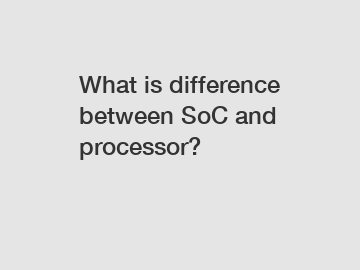Are you confused about the difference between a System on a Chip (SoC) and a processor? Don't worry, you're not alone! Many people are unsure about the distinction between these two important components of electronic devices. Let's break it down in simple terms to help you understand the key differences between an SoC and a processor.
What is a Processor?
Let's start with the basics. A processor, also known as a central processing unit (CPU), is the brain of a computer or electronic device. It is responsible for carrying out instructions and performing calculations, allowing the device to function properly. Processors come in different sizes and speeds, but they all serve the same essential purpose.

What is an SoC?
Now, let's talk about SoCs. A System on a Chip (SoC) is a complete computer system on a single chip. In addition to a processor, an SoC typically includes other components such as memory, input/output interfaces, and sometimes even a graphics processor. SoCs are commonly used in smartphones, tablets, and other portable devices where space is limited.
Key Differences.
1. Integration: .
The main difference between an SoC and a processor is the level of integration. While a processor is a standalone component, an SoC combines multiple components on a single chip. This integration allows for a more compact and efficient design, making SoCs ideal for small, portable devices.
2. Functionality:
Another key difference is the functionality. A processor is primarily responsible for processing instructions and performing calculations, while an SoC includes additional components that help the device function as a whole. This difference in functionality makes SoCs more versatile and capable of handling a wider range of tasks.
3. Usage:
Processors are commonly used in desktop computers, servers, and other devices where space is not a limiting factor. On the other hand, SoCs are preferred in smartphones, tablets, smartwatches, and other portable devices where compact size and energy efficiency are crucial.
4. Efficiency:
Because of their integrated design, SoCs are generally more energy-efficient than standalone processors. This efficiency is a big advantage for portable devices that rely on battery power to operate.
In conclusion, while a processor and an SoC both play essential roles in electronic devices, they are not the same. Processors are standalone components that focus on processing instructions, while SoCs combine multiple components on a single chip to create a complete computer system. So next time you pick up your smartphone or tablet, remember that it's powered by an SoC, not just a processor!
So, if you have any more questions about SoCs or processors, feel free to contact us. As a trusted supplier of electronic components, we are here to help you understand the technology that powers your favorite devices.
For more smart-module-mt8735, sbc embedded system, rk3588s sominformation, please contact us. We will provide professional answers.


Comments
Please Join Us to post.
0